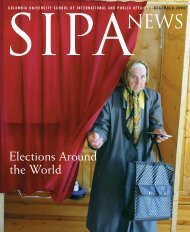Promoting IDPs' and Women's Voices in Post-Conflict Georgia
Promoting IDPs' and Women's Voices in Post-Conflict Georgia
Promoting IDPs' and Women's Voices in Post-Conflict Georgia
- No tags were found...
You also want an ePaper? Increase the reach of your titles
YUMPU automatically turns print PDFs into web optimized ePapers that Google loves.
high levels of unemployment <strong>and</strong> poverty, just as IDP communities do. 335 However, these issues hitvulnerable groups like IDPs most acutely. 336 While there is sympathy across <strong>Georgia</strong>n society for theplight if IDPs, it does not necessarily translate <strong>in</strong>to susta<strong>in</strong>ed support. Experts argue that IDPs should beperceived as a resource rather than just “passive receivers of assistance.” 337 It seems that IDPs have akey role to play <strong>in</strong> the effort to shift this perception.The NGO community has approached IDPs <strong>in</strong> order to help transform passivity <strong>in</strong>to mobilization. TasoFoundation Director Mar<strong>in</strong>a Tabukashvili discusses her organization’s <strong>in</strong>itiatives to engage IDPs by firstexp<strong>and</strong><strong>in</strong>g their “underst<strong>and</strong><strong>in</strong>g of the importance of participation.” 338 Experts note that this populationis primarily mobilized around issues directly concern<strong>in</strong>g IDPs, such as hous<strong>in</strong>g <strong>and</strong> social assistance.Rather than actively engag<strong>in</strong>g on other political issues, “as a group, [IDPs] are not seen as participat<strong>in</strong>g<strong>in</strong> usual political life.” 339 Organizations such as Taso therefore work to promote IDPs’ participation atvarious levels, from community development projects to national policies.Some extreme examples of IDPs protest<strong>in</strong>g their situation also do exist, counter<strong>in</strong>g the image of them aspassive members of society. In a case of self-immolation, an IDP woman named N<strong>in</strong>a Pipia protested thegovernment’s neglect of IDPs. 340 Paata Davitaia of the parliamentary party ‘European Democrats’(formerly the ‘On Our Own’ Party) described this situation: “The woman…went to the m<strong>in</strong>istry to <strong>in</strong>quireabout accommodation...The [MRA] Deputy M<strong>in</strong>ister told...[her] to eat grass, <strong>and</strong> the woman burnedherself <strong>in</strong> front of the m<strong>in</strong>istry. “ 341 A gender researcher noted that “it was like a suicide for her.” Shealso commented on the lack of mobility follow<strong>in</strong>g Ms. Pipia’s death: “I can’t see many IDP womenactive…Maybe there are s<strong>in</strong>gly persons who are do<strong>in</strong>g someth<strong>in</strong>g, but not so many. But this is aproblem not only with IDPs, but <strong>in</strong> <strong>Georgia</strong> generally.” 342 This example serves as perhaps the mostradical case counter<strong>in</strong>g the idea that IDPs are passive. Moreover, it highlights that <strong>Georgia</strong>n society <strong>in</strong>general seems to lack significant engagement <strong>in</strong> political life. The failure here to <strong>in</strong>spire the IDPcommunity <strong>and</strong> broader society to mobilize <strong>and</strong> achieve tangible changes could promote further lack offaith <strong>in</strong> the efficacy of political protest, thereby encourag<strong>in</strong>g passivity.IDP Identity <strong>and</strong> StatusIdentity serves as a fundamental psychosocial factor <strong>in</strong>fluenc<strong>in</strong>g IDP participation. The experience ofdisplacement is often one that <strong>in</strong>delibly impacts a person’s view of his- or herself <strong>and</strong> relationship todifferent communities <strong>in</strong> post-displacement life. IDP identity may connect with pa<strong>in</strong>ful memories of loss<strong>and</strong> displacement. Life <strong>in</strong> displacement also imbues a status that <strong>in</strong>fluences IDPs’ day-to-day needs, <strong>in</strong>335 Maria Guledani, Personal Interview.336 Ombudsman Representative, Personal Interview, 15 March 2012.337 Manana Gabashvili, Personal Interview.338 Mar<strong>in</strong>a Tabukashvili, Personal Interview.339 Nana Sumbadze, Personal Interview.340 Radio Free Europe-Radio Liberty, “Self-Immolation Incident Highlights Desperation of <strong>Georgia</strong>n IDPs,” 29 Oct 2012, accessed7 May 2012, 341 Paata Davitaia, Personal Interview.342 Gender researcher, Personal Interview, 21 March 2012.65

















